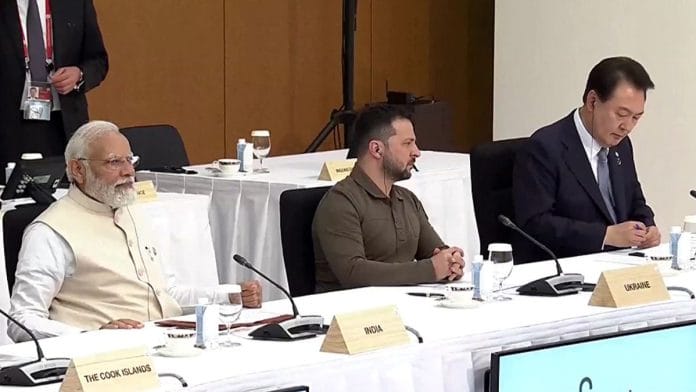At the dawn of a new term, Prime Minister Narendra Modi has a unique opportunity to play peacemaker at an event seen by many in the West as the most important peace summit since World War 2.
More than two years into Russia’s invasion of Ukraine, Kyiv is holding a Global Peace Summit in Switzerland on 15-16 June. It seeks to win support for a 10-point peace plan that requires Russian troops to leave its territory and cease hostilities.
While it expects over 100 countries to attend, the notable absentees include Russia, which wasn’t invited, and China, which declined to participate citing Russia’s exclusion.
India, led by PM Modi, should seize the moment. New Delhi’s case for being the leader of the so-called ‘Global South’ is as strong as it has ever been, especially in the wake of its successful G20 leadership.
Modi’s presence at the summit could help position India as a torchbearer for the concerns of emerging economies, including the energy crisis, food insecurity, and supply chain shocks—all of which have been aggravated by the war in Ukraine.
Further, India’s consistent advocacy for peace—combined with Modi’s stature and longevity in power—lend it a highly credible voice in the ongoing conflict. It is a voice that carries the weight of 1.4 billion people, now keenly solicited by Ukraine and Europe, which have toned down their initial criticism of India’s non-aligned stance.
Championing the cause of emerging economies
While not a direct party to the Russia-Ukraine conflict, the developing world has been hit hard by its repercussions. Chief among these are shocks in the global energy and commodities markets, including significant increases in the prices of oil, wheat, and metals.
Russia is one of the world’s leading energy suppliers, and both Russia and Ukraine export several key commodities. The OECD, a group of mostly high-income countries, reports that budgets for development funding in emerging economies are stretched due to the overlapping effects of the war, the Covid-19 pandemic, and a growing need for humanitarian aid.
A 2023 study by researchers at the Global Wheat Program and the University of Arkansas showed just how grave the ripple effects can be. They estimated that if wheat supplies from the conflict zone dried up completely, annual per capita consumption could fall by a staggering 57 per cent in sub-Saharan Africa in the absence of other import sources.
India’s successful G20 presidency in 2023 culminated in a joint declaration on the conflict as well as the inclusion of the African Union in the bloc—both clear signs of its growing influence in shaping the emerging global order. New Delhi’s non-aligned position and well-established diplomatic relationships with Ukraine and Russia provide it with a solid foundation to spearhead advocacy for the concerns of emerging economies at next week’s peace talks.
At a time when both the Western and the developing economies acknowledge India’s leadership, it can help chart out an actionable path towards peace in Europe and economic security in the ‘Global South’.
Also read: SCO is not an anti-Western club. India’s presence is a guarantee against it
Three pillars for peace
India’s long history of promoting peace globally through its foreign policy and diplomacy, contributions to peacekeeping missions, and civilisational ethos is widely recognised and respected. In the current scenario, it has not outrightly condemned aggression by Russia—a valued and longstanding strategic partner—but it has persistently pushed for a peaceful solution that respects all stakeholders, including Ukraine.
It has recognised the human cost of the conflict and provided humanitarian aid to Ukraine. India’s ability to speak to Russia as a trusted partner means it is uniquely positioned to play a mediator in the ongoing conflict.
At the Shanghai Cooperation Organisation (SCO) meeting in Samarkand in September 2022, PM Modi publicly said to Russian President Vladimir Putin, “Today’s era is not of war.” Further, India is reported to have played a role in supporting US efforts in late 2022 to assess and contain the possibility of a nuclear escalation by Russia.
Echoing comments made by PM Modi at the SCO meeting, New Delhi could use the summit in Switzerland to stress the importance of democracy, diplomacy, and dialogue as the three pillars for peace in Ukraine and lasting stability in Eastern Europe.
Also read: Israel-Iran conflict is bad news for Russia. Moscow is dependent on Tehran for drones
Way forward for India
It is in India’s strategic interest to ensure that peace returns to Europe as soon as possible. The conflict has so far forced it to walk an uncomfortable strategic tightrope.
On the one hand, it must preserve its historic ties with Russia, which are now particularly important given its rivalry with neighbouring Pakistan and China. On the other, it must nurture its growing relationship and cooperation with Western powers united in their condemnation of Moscow.
By spearheading the peace talks in Switzerland, PM Modi can further boost his credentials as a global leader of substance. But success in mediating the Russia-Ukraine conflict will also bring India several long-term benefits, including stronger international partnerships and enhanced global influence.
Given India’s rising power in the global inter-state hierarchy, this kind of leadership from New Delhi is the need of the hour.
Harsh V. Pant is Vice President of Studies and Foreign Policy at the Observer Research Foundation (ORF) in New Delhi. Views are personal.
(Edited by Prasanna Bachchhav)






